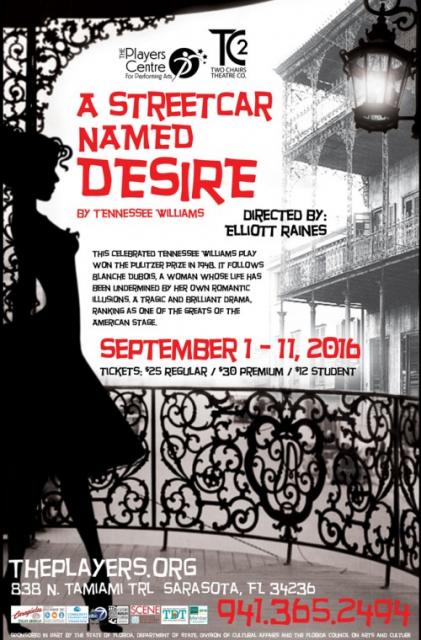
Director Elliott Raines has made sure no one mistakes his take on A Streetcar Named Desire is in any way tied to the famous movie version. Brunette Blanche (Alana Opie) may be mentally deteriorating, but her sturdy build and posture and spring-patterned dress belie her condition. She seems fit to be protector of her slight blond younger sister Stella (sweet Lauren Ward) with whom she’s come to stay in New Orleans after losing their ancestral estate. Also her last home and job. But will she want to get Stella to leave husband Stanley, or will Blanche herself be able (and even willing) to stay? While being true to Tennessee Williams’s provocative text, poetic and full of animal imagery, Chris Hines’ Stanley is a boor but no Brando. He’s a recent WWII veteran, a factory worker, and a Southern guy’s guy who loves playing cards, boozing, gnawing chicken, and hotly bedding down his enthusiastically compliant new wife. If he hits her when she pulls class on him, it’s only another violent action in a play that begins with domestic violence between upstairs neighbors. They quickly go through love-making reconciliation, as will happen between Stanley and Stella. A portrait photo of confident Stanley in uniform on Stella’s bedroom vanity suggests when they met, why she fell for him, and that no amount of talk from big sister will get her up and away. Of course, overhearing such a conversation between them fuels Stanley’s final fury at Blanche. That’s built up as she’s preened, put on airs, tried to hide her age and “make it” with his buddy Mitch (Allen Kretschmar, admirable as nice but a repressed mama’s boy). Stanley never misses a jab at Blanche’s attempts to escape her situation by taking over his bathroom and scarfing down his liquor. He’s clear about making inquiries regarding his wife and Blanche’s estate. How could Blanche think she’d get away from an awful past? Isn’t it, this production of the play asks, because she can’t really think? That her head is full of music from scores of tragedies? There’s also a question of sexual attraction between Stanley and Blanche, which both Hines and Opie suggest at the start but then tried to quash. Isn’t Blanche, then, finally like her compliant sister? Or does a different factor make Stanley a rapist? Director Raines hasn’t avoided controversy, but that’s what makes his interpretation of the play memorable. The actors are indeed an effective ensemble. Still, most have an individual stand-out scene, as do Lynne Doyle as soothing neighbor Eunice and Ren Pearson as a pleasant but perplexed newspaper subscription collector who reminds Blanche of her young husband who killed himself. John Forsythe as an asylum Doctor proves to be the kind stranger on whom Blanche willingly depends to take her away. Two Chairs Company eschews emphasis on production values in favor of literary ones, but Ken Junkins’s set here amply presents New Orleans workers’ digs. Since Blanche maintains she “loves clothes,” Ross Boehringer has given her exactly the kind she’d choose, including a useless (and unused) faux-fur scarf. He’s avoided a torn tee shirt for Stanley, whose tattoo better defines Chris Hines in the role. Bill Naimy illuminates everything on the split stage perfectly for the time and the atmosphere. And Seth Berry supplies musical memories, bridges between scenes, and everyday sounds in house and outside.
